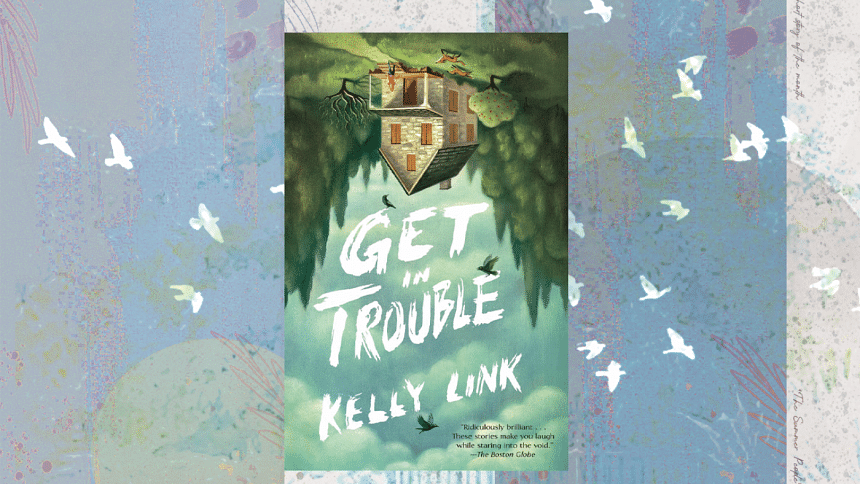Kelly Link’s ‘The Summer People’ and an escape from writer’s block

In the summer of 1948, Shirley Jackson wrote two short stories in quick succession—her controversial classic "The Lottery" and the underappreciated "The Summer People". Even more astounding is her finishing the former in one morning's worth of work. "This, as any writer of stories can tell you, is not a usual thing", Jackson later recalled in Come Along with Me (Viking Press, 1968)." In 2011, American author and editor Kelly Link wrote within a week and published in Tin House Magazine her fantasy-horror short story, "The Summer People". The story, of course, bears no great resemblance to its 1948 namesake—Jackson's tells the terrifying tale of a couple overstaying their welcome at a summer cottage; Kelly's tells of classmates Fran and Ophelia's venture into the estate of the titular "summer people". Perhaps the two aren't too dissimilar. "I liked the idea of writing a story where all the play between Jackson's story and mine would come from the reader, rather than from me", Link told Longreads when asked about the two stories' linkage. Fate had it that in July of 2012, Link's "The Summer People" would win the Shirley Jackson Award for 'Best Novelette'.
As for this reviewer, where was he during the time of his discovering Link's delightful, 10,500-word story? I was nearabouts a personal worst. This was 2018, my third year into my undergraduate studies, and my first since switching from a major in marketing to English literature. The switch was to facilitate my improving as a writer, as all year round I had enlisted in the highest-level courses, from '17th Century Poetry and Prose' to 'Elizabethan and Jacobean Drama' to 'South Asian Literature in English'. But while I was learning more and more of world literature, my writing, though more frequent, was showing little to no signs of improvement—this, as any writer can attest, is equivalent to regression.
I didn't know what I had done wrong. My grades were holding steady, and I had won the favour of a few teachers, whose advice I even now seek out. It had gotten to a point, near the end of the year, where I had produced works I still look at and shudder, and worse yet, I had begun to write less. I began to sleep more, I began to skip meals, avoid friends. I was easily irritable; the slightest things set me off—though I didn't say anything, or let it out—I just took it back with me to sleep. I had myself become a barrier to my writing.
I tried my hand in reading. Despite being a writer and a literature major, my reading habits were irregular at best. I would finish one book, cherish it, and put off reading for months, or a year, at a time. And so, I tried short stories and collections. They were minor investments that I could put off and return to at any time. I eyed, naturally, my favourite authors. I wiped the dust off the covers of collections bearing the names of F Scott Fitzgerald, Stefan Zweig, Franz Kafka, Flannery O'Connor, but each of those books, I just as soon put back down. They failed to elicit anything in me, my biggest inspirations, when once they would have me running to my pen and paper.
Next in my foraging was a book I had bought a year before. A pretty cover, a pretty typeface, and a quote from Neil Gaiman hailing its author as a "national treasure" (re-reading Gaiman's The Sandman comics fared slightly better than the above heroes, though not to any great extent). The book was Link's Get in Trouble (Random House, 2016), and I thought I would read one, maybe two stories.
The first listed in the collection was "The Summer People", and, before I knew it, I was flipping endlessly through pages. I didn't know any of its plot beats. I went in knowing little about the author and littler about her stories, and I can only encourage readers to do the same. It takes place in rural Robbinsville, there are trees upon trees, mosses gathering over mountains, flowers climbing in and out, roads long and thin, twisting long and about. We have protagonist Fran, and soon, Ophelia. What happens in this dark, winding story is a slippery journey, with discovery, on the reader's part, playing a large role. This modern faery tale recalls fables of old, from The Brothers Grimm to The Faerie Queene (1590), with every speck on the page inching closer to a small, new world.
Link's writing was new, ageless, and it seemed to me a boundless concoction of stories. At some point I had begun to view stories, poems, literature, art, as commodities to consume and, to some length, replicate. They had borders, a set beginning and end, and it took the fantastical, the personal, stories of this author to remind me how special and peculiar modern literature can be.
After I had finished with "The Summer People", and soon the entire collection, I could do nothing but write. Something somewhere had unclogged and I thought only of stories and ideas. I could now manage only a handful hours of sleep—I devoted more time to the blacks of my eyelids where I visualised and stringed together scenes and settings. The first story I completed was a 17,000-word short story, which centred around two women's discovery of a blackhole deep in a forest. It took me roughly two months to finish, and it somehow didn't dawn on me that I was riffing on the tradition of the eponymous summer people of Link's tale. My story, though, wasn't particularly excellent, but the sudden rush I had received catapulted me enough that I kept writing and writing—this is was, finally, that much-craved progress.
When I had first envisioned our "Short Story of the Month" feature, it was Kelly Link's wonderful collection that I had in mind, and especially its wonderful highlight. "The Summer People" is about, in the simplest—and in the author's own—words: "a desire to escape". For readers who yearn for this most human instinct, you won't find a better exit chute than in these 35 pages.
Kelly Link's "The Summer People" can be found in the short story collection Get in Trouble (Random House, 2016) or on the WSJ website.
Mehrul Bari S Chowdhury is a writer, poet, and artist. His work has appeared or is forthcoming in Blood Orange Review, Kitaab, and Sortes Magazine, among others. He is currently the intern at Daily Star Books.

 For all latest news, follow The Daily Star's Google News channel.
For all latest news, follow The Daily Star's Google News channel. 



Comments